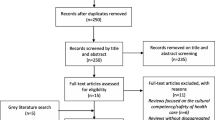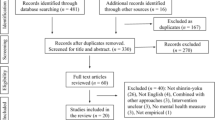Abstract
Despite growing numbers of American Muslims, little empirical work exists on their use of traditional healing practices. We explored the types of traditional healing practices used by American Muslims in southeast Michigan. Twelve semi-structured interviews with American Muslim community leaders identified through a community-academic steering committee were conducted. Using a framework coding structure, a multidisciplinary investigative team identified themes describing traditional healing practices. Traditional healing practices can be categorized into three domains: Islamic religious text based practices, Islamic worship practices, and folk healing practices. Each domain may further contain therapies such as spiritual healing, medicinal herbs, mind body therapy, and dietary prescriptions. Traditional healing practices are utilized in three capacities of care: primary, secondary, and integrative. Our findings demonstrate that American Muslims actively utilize traditional healing practices. Healthcare practitioners caring for this population should be aware of the potential influence of these practices on health behaviors.

Similar content being viewed by others
References
Muslim American Market. Muslim American demographic facts. (http://www.allied-media.com/AM/index.html). Accessed August 23. 2010.
Pew Research Center. Muslim Americans: Middle class and mostly mainstream. (http://pewresearch.org/pubs/483/muslim-americans). Accessed August 15. 2010.
WHO Media centre. Traditional medicine. (http://www.who.int/mediacentre/factsheets/fs134/en/index.html). (December, 2008), Accessed July 31. 2010.
Al-Krenawi A, Graham JR. Culturally sensitive social work practice with Arab clients in mental health settings. Health Soc Work. 2000;25(1):9–22.
Azaizeh H, Saad B, Cooper E, Said O. Traditional Arabic and Islamic Medicine, a Re-emerging Health Aid. Evid Based Complem Alternat Med. 2010;7(4):419–24.
Al-Akili M, Iban Abi Bakr Ibn Qayyim Al-Jawziyah M. Natural Healting with Tibb Medicne: Medicine of the prophet. Philadelphia, PA: Pearl Publishing House; 1993.
Kulwicki A. Arab women. In: Julia M, editor. Constructing gender: Multicultural perspectives in working with women. Belmont, CA: Brooks/Cole; 2000.
Cassileth BR, Deng G. Complementary and alternative therapies for cancer. Oncologist. 2004;9(1):80–9.
Nestler G. Traditional Chinese medicine. Med Clin North Am. 2002;86(1):63–73.
Israel BA, Eng E, Schulz AJ, Parker EA. Methods in community-based participatory research for health. San Francisco: Jossey-Bass; 2005.
Patton MQ. Qualitative evaluation and research methods. Beverly Hills: Sage Publications; 1990.
Weiss RS. Learning from strangers: The art and methods of qualitative interview studies. New York: The Free Press; 1994.
Barnes P, Powell-Griner E, McFann K, Nahin RL. Complementary, alternative medicine use among adults: United States, 2002. Seminars in Integrative Medicine. 2004;2(2):54–71.
Chan K. Some aspects of toxic contaminants in herbal medicines. Chemosphere. 2003;52(9):1361–71.
Acknowledgments
This study was funded through the Robert Wood Johnson Foundation Clinical Scholars Program, and by the Institute of Social Policy and Understanding. The time-effort put forth by AIP and AK was funded though the Robert Wood Johnson Foundation Clinical Scholars Program. Dr. Fetters’ participation was made possible in part through the generous support of the Jitsukoukai Foundation. The study was presented in part at the Islamic Social Services Association National Conference 2010 in Dearborn Michigan. The authors thank our respondents for sharing their time and insight with us, as well as the community partners and steering committee members for their invaluable insight, recruitment assistance, and support: Muzammil Ahmed MD, Hamada Hamid DO MPH from the Institute for Social Policy and Understanding, Najah Bazzy RN from the Islamic Center of America, Mouhib Ayyas MD from the Islamic Shura Council of Michigan, and Ghalib Begg from the Council of Islamic Organizations of Michigan. We also thank Amanda Salih MPH for aiding in interviews, coding manuscripts, and data analysis, and Jane Forman ScD, MHS for interview guide development and qualitative interview training.
Author information
Authors and Affiliations
Corresponding author
Rights and permissions
About this article
Cite this article
AlRawi, S., Fetters, M.D., Killawi, A. et al. Traditional Healing Practices Among American Muslims: Perceptions of Community Leaders in Southeast Michigan. J Immigrant Minority Health 14, 489–496 (2012). https://doi.org/10.1007/s10903-011-9495-0
Published:
Issue Date:
DOI: https://doi.org/10.1007/s10903-011-9495-0




